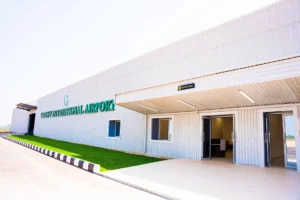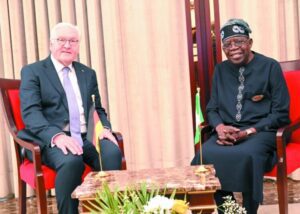


Tax reforms: Why Supreme Court must not rule in favour of States – Oyedele
…Says decentralising VAT collection will halve revenue for all states
…Nigeria on threshold of fundamental economic reform through tax bills – Minister
By Matthew Denis
The Chairman of the Presidential Fiscal Policy and Tax Reforms Committee, Taiwo Oyedele, has urged the Supreme Court not to rule in favour of the States in the ongoing dispute over Value Added Tax (VAT) collection, noting that decentralising the collection of Value Added Tax (VAT) would result in over a 50 percent revenue loss for all states across the federation.
Oyedele made this statement in response to concerns raised by the Revenue Mobilisation Allocation and Fiscal Commission (RMAFC) regarding the VAT revenue-sharing formula outlined in the tax reform bills currently before the National Assembly.
In a detailed statement on Wednesday, Oyedele emphasised the importance of the reforms for ensuring Nigeria’s inclusive growth and addressed specific issues raised by the RMAFC.
He called for constructive dialogue to resolve disputes surrounding VAT administration, particularly the ongoing legal battle between Rivers and Lagos states and the federal government over the control of VAT.
Oyedele explained that VAT, introduced in 1993 to replace the sales tax previously administered by states, is collected centrally for efficiency reasons but remains fundamentally a state tax.
“Shifting VAT collection away from the centralised system will not only lead to a significant revenue loss of over 50% for all the states, but they will also face challenges in collecting VAT, as was the case under the old sales tax regime managed by the states and the consumption tax currently collected by some states,” the tax reform chairman said.
At present, 85% of VAT revenue is allocated to states, with the federal government retaining 15%, despite generating a substantial portion through import VAT and collections in the Federal Capital Territory (FCT), Oyedele noted.
As VAT is not explicitly mentioned in the 1999 Constitution, it falls under the residual powers of the states. This has led to disputes over its administration and the formula for sharing the revenue.
Oyedele also clarified that VAT revenue is held in a special pool account, separate from other federation revenues, and is distributed without the involvement of the RMAFC, similar to stamp duties, which are allocated based on 100% derivation to states.
He further explained that the tax reform bills aim to address longstanding inequities in VAT distribution and resolve both legal and practical challenges.
According to Oyedele, significant consequences could arise if the Supreme Court rules in favour of Rivers and Lagos states, allowing them to collect VAT at the state level, noting that “there is a pending case seeking to administer VAT as a state tax in view of the perceived inequity in the current distribution formula.”
He pointed out that while the RMAFC had previously conducted nationwide consultations on revenue-sharing formulas, VAT was excluded from these discussions despite its inequities. Oyedele urged the commission to join the ongoing consultations with key stakeholders to develop a workable solution.
…Nigeria on threshold of fundamental economic reform through tax bills – Minister
Meanwhile, the Minister of Information and National Orientation, Mohammed Idris, has announced that Nigeria is on the verge of fundamental economic reforms, primarily through the proposed tax reform bills introduced by President Ahmed Tinubu.
He made the statement during his opening speech as Chairman at the 2024 Annual General Meeting of the International Press Institute (IPI) Nigeria, held in Abuja on Wednesday.
Speaking on the theme “Democracy, Media Freedom, and the Imperative of Protecting Nigeria’s Civic Space,” the Minister said, “It is my privilege to inform this distinguished audience that our country stands at the threshold of profound economic reform, truly unprecedented, largely known as the Renewed Hope Agenda. This initiative represents a deliberate and comprehensive recalibration of a long-neglected system aimed at economic diversification, human capital development, infrastructure, innovation, competitiveness, and inclusive growth.”
He continued, “One of the most significant examples of this reform is the tax initiative, which will significantly simplify Nigeria’s existing tax structures, making compliance easier while reducing the tax burden on the most vulnerable Nigerians.”
“A key aspect of this reform is the introduction of several new tax exemptions, which will benefit various categories of individuals and businesses,” he added.
The Minister further explained that these tax reforms are part of broader macroeconomic changes that aim to convert trillions of Naira, previously lost to wasteful and abused subsidy programmes, into substantial savings. These savings are now being directed to finance productive sectors such as high-impact physical and digital infrastructure, student loans and stipends, low-cost consumer credit, agricultural production, targeted social investment, and more – all fundamental components required for a prosperous and globally influential nation.
Acknowledging the contributions of the IPI, the Minister praised the Institute for building a formidable reputation over the past 74 years as a global platform advancing the rights, protection, and training of journalists.
He noted that the Nigerian chapter of the IPI has lived up to these ideals, and the calibre of Nigerian media executives and professionals associated with the IPI is a testament to the prestige it has maintained over the decades, as well as the vital role it occupies in the media landscape.
The Minister further highlighted that the Nigerian press has produced some of the country’s most talented and remarkable professionals, including great writers, broadcasters with golden voices, innovative entrepreneurs, and media proprietors. However, he stressed that the greatest asset of the Nigerian press lies not only in professional talent but also in its boldness and fearlessness in the face of intimidation. The press’s unyielding capacity to speak truth to power, regardless of the consequences, remains its most significant strength.
“It is about recognising that every right comes with a corresponding responsibility, and that freedom is not without bounds. Media freedom is about understanding the immense power the press wields, as both shapers of public opinion and custodians of the public record, and using that power responsibly,” the Minister said.
Earlier, IPI President Musikilu Mojeed expressed gratitude to partners, sponsors, and supporters for making the conference possible. He said, “Your unwavering commitment to press freedom and democratic values is invaluable. To all participants, I encourage you to actively engage in the discussions, ask questions, and share your thoughts. Your contributions will undoubtedly enhance our efforts to promote democracy, media freedom, and civic space in Nigeria.”
Mojeed also called for collective action: “Let us work together to build a society where journalists can operate freely, without fear of intimidation or harassment. Let us advocate for policies that promote transparency, accountability, and the free flow of information.”
The Chairman of the Board of Trustees, Mallam Kabiru Yusuf, stressed that the IPI focuses on a broader principle: ensuring press freedom, which underpins the work of journalists and the overall health of society.
He emphasised, “Protecting this freedom ensures accountability and upholds the collective liberty of all citizens. Freedom, much like health, is often undervalued until it is lost. It is our duty as journalists to protect it, not just for our profession, but for society at large. Journalism transcends sectional divides—it unites us in the pursuit of truth and accountability.”



